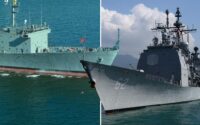Waiver said ‘death’ three times
Mike Reiss took extra paper with him to the bottom of the North Atlantic Ocean in case the deep-sea submersible didn’t return to the surface getting a glimpse of the sunken Titanic last year.
Reiss – an Emmy Award-winning writer-producer for “The Simpsons” – descended 13,000 feet with four others inside OceanGate Expedition’s Titan submersible to see the historic wreckage.
“He knew this was very dangerous,” Reiss’ wife, Denise, told The Post Tuesday. “Even in the most dire situations, he has a joke.”
Reiss returned safely – but now the carbon-fiber submersible is missing. On board are OceanGate CEO Stockton Rush; Paul-Henry Nargeolet, a marine archaeologist who has made dozens of dives to the site; British billionaire explorer Hamish Harding; and British-Pakistani father Shahzada Dawood and his son Sulaiman, scions of a business dynasty.
Just a small handful of people have been to the bottom in the vessel, among them Reiss. In July last year the Reisses paid more than $100,000 – they declined to say exactly how much – to be part of the expedition.

They flew from home in New York to St. John’s, Newfoundland, then set sail on board the MV Polar Prince, steaming south for 400 miles.
There was plenty of time to contemplate the dangers of such a precarious trip to the bottom of the ocean.
“Death is always lurking, it’s always in the back of your mind,” Reiss, 63, told The Post. “Before you even get on the boat, there’s a long, long waiver that mentions death three times on page one.”
The Polar Prince stopped roughly above the Titanic’s wreckage, where it has sat since April 15, 1912, seen by only a few hundred people. More people have been in space than have set eyes on it.

The couple were both due to dive to the wreckage, but Denise tested positive for COVID, leaving her on the support vessel, watching her husband’s descent.
Reiss received no specialized training before getting into the Titan aside from how to get into a survival suit.


He and his four fellow divers were bolted into the submersible from the outside. They brought cameras, then sat on the floor inside the curved hold just 22 feet long
“It’s like if you took a minivan and took all the seats out, that’s the amount of space you have,” Reiss said. “It’s sort of beautifully designed inside, it feels sort of like a waiting room at a spa, quiet and comfortable.”
Then they sank “like a stone,” gently falling for two hours and 30 minutes.

“The sub is very, very simple,” the veteran television writer told The Post. “You basically push it in the water and it sinks like a stone. So, it hits bottom and then you sail around and you’re sort of powered by engines that look like desktop fans.”
It was so peaceful that Reiss fell asleep. “People talk about the excitement, the thrills, and, ‘Were you scared?’” Reiss continued. “And it’s like, ‘I feel asleep.’”
The 23,000-pound vessel is steered by a video game controller, Reiss said. He did not feel unsafe during the dive.
“So, it’s super simple technology, which is very calming,” he joked. “It’s not high-tech.”

When they hit the ocean floor, Reiss said the pilot realized the submersible was just 500 yards away from the main wreckage of the Titanic.
“But we didn’t know where and the compass stopped working,” Reiss said. “We spent about 90 minutes just hunting around, trying to find the Titanic but it’s just so dark down there.”
By the time the submersible “stumbled” on the wreckage site, the five had only 20 minutes to gaze at the tragic liner.
“That’s just the luck of the draw. That’s what you got. And you’re at the mercy of weather, and water and technical problems.”


The five crowded around the tiny porthole, only slightly larger than a washing machine door, taking turns to see the awesome sight of the Titanic, lit up by the Titan’s lights.
“I mostly felt like I was seeing a celebrity in person,” Mike said of seeing the Titanic wreckage. “My thought was, ‘Wow, she looks just she does in the pictures.’”
Passengers who took a trip to the site the following day had more than three hours on the ocean floor, Reiss said.
Reiss didn’t feel cramped or claustrophobic inside the vessel – which he praised as a “masterpiece of design.”

But then came the long ascent, with a dramatic ending.
The “beautiful and sleek” Titan, looking like something straight out of “Star Wars,” encountered buoyancy issues last summer.
To fix the issue, crews strapped huge pieces of “high-tech Styrofoam” to the vessel – a “makeshift” fix to the problem, Reiss said.
As the Titan resurfaced, a winch on the Polar Prince lifted it straight up, Reiss said.
“When the winch grabbed us, the sub went vertical suddenly and all of us five people plunked to the bottom,” Reiss said.

“All of our computers, our food, our water, everything just fell on top of us. And we hung that way for a while.”
Reiss’ wife watched every minute of her husband’s eight hours in the Titan from the Polar Prince.
“I was very concerned all the time, of course,” she said. “We weren’t supposed to be separated, so I had these terrible feelings on what if something happened. I had that fear. I watched every minute of the dive.”
The couple had previously considered booking another OceanGate excursion so Denise could see the wreckage, because although both are fascinated by the Titanic, actually seeing it had really been on her bucket list.

“It had never been my dream, it was my wife’s dream,” he said
Reiss said he didn’t feel unsafe during the deep-sea dive, but would not take the risk again.

“It’s definitely being invented as it goes along,” he said. “I don’t want to disparage it, but it reminds me of the early days of aviation or the space program, where a lot of thought goes into it and then they find a problem.
“The idea that they could be just sitting there lost and waiting for time to run out,” he said of the five trapped adventurers. “That’s a very scary thought.”

Reiss said he empathized with relatives of the five missing people as rescuers, including US Coast Guard vessels, scoured the Atlantic Ocean Tuesday about 435 miles south of Newfoundland.
“It’s a very tiny vessel in a very big ocean,” he said. “It is built to go where no other vessel to go, so if it’s stuck on the bottom of the ocean, I can’t foresee a way out.”


